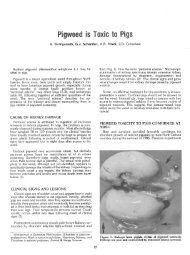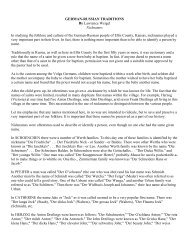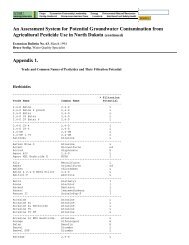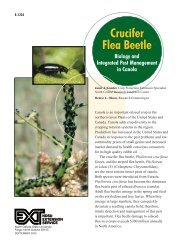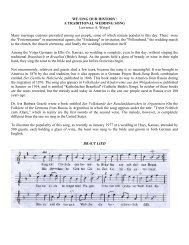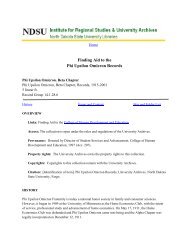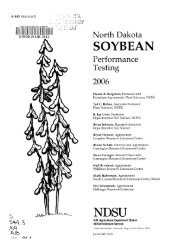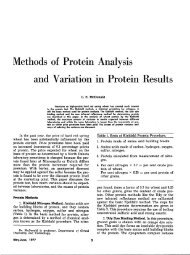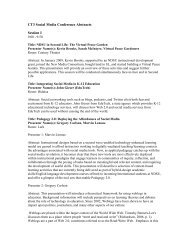germans from russia in fort collins, 1900-2000 - Libraries
germans from russia in fort collins, 1900-2000 - Libraries
germans from russia in fort collins, 1900-2000 - Libraries
You also want an ePaper? Increase the reach of your titles
YUMPU automatically turns print PDFs into web optimized ePapers that Google loves.
WORK RENDERS LIFE SWEET: GERMANS FROM RUSSIA IN FORT COLLINS<br />
“Second Hoe<strong>in</strong>g was too realistic a commentary<br />
on German-Russian family relationships<br />
and child labor practices to be taken calmly <strong>in</strong><br />
the 1930’s,” writes Kenneth Rock, a history<br />
professor at Colorado State University.<br />
“Now…it is possible to consider Sykes’s<br />
novel a historical document.” 3<br />
Germans <strong>from</strong> Russia today comprise<br />
one of the largest ethnic groups <strong>in</strong> Colorado.<br />
Indeed, the state’s orig<strong>in</strong>al German-Russian<br />
settlers now have over 200,000 liv<strong>in</strong>g descendants,<br />
many of them concentrated <strong>in</strong> Larimer<br />
and Weld counties. Yet Germans <strong>from</strong> Russia<br />
have not rema<strong>in</strong>ed isolated as they were <strong>in</strong><br />
Russia and do not appear so foreign to<br />
Americans today. Second- and third-generation<br />
German-Russians revolted aga<strong>in</strong>st a<br />
cycle of gruel<strong>in</strong>g labor, develop<strong>in</strong>g a sense of<br />
ambivalence toward their heritage. Their<br />
ancestors clung to their eighteenth-century<br />
traditions as they survived and prospered on<br />
the brutal steppes of Russia. Yet, with<strong>in</strong> one<br />
generation <strong>in</strong> the United States, those traditions<br />
and values crumbled. Anthropologist<br />
Timothy Kloberdanz argues that the attitudes<br />
Germans cultivated while <strong>in</strong> Russia no longer<br />
held true <strong>in</strong> the New World: “Although the<br />
Volga Germans had regarded themselves as<br />
‘privileged colonists’ and the ‘carriers of a<br />
higher culture’ <strong>in</strong> Russia, such self-concepts<br />
were of little consolation <strong>in</strong> America,”<br />
Kloberdanz writes. “Some Americans regarded<br />
the early Volga Germans as backward and<br />
illiterate Russian peasants….” 4 In an oral history<br />
<strong>in</strong>terview Martha Krug concurred with<br />
Kloberdanz’s argument: “…I remember com<strong>in</strong>g<br />
to town to shop with my mother, here <strong>in</strong><br />
Fort Coll<strong>in</strong>s, and she would <strong>in</strong>sist on speak<strong>in</strong>g<br />
German and it was very, very embarrass<strong>in</strong>g<br />
to me.” 5<br />
Yet the last<strong>in</strong>g contributions of the<br />
German-Russian community to Fort Coll<strong>in</strong>s<br />
are far <strong>from</strong> <strong>in</strong>visible. Beyond the neighborhoods<br />
and churches, surnames and traditions,<br />
there has been a reawaken<strong>in</strong>g of <strong>in</strong>terest <strong>in</strong><br />
German-Russian culture <strong>in</strong> America, spawn<strong>in</strong>g<br />
a long-deserved second look at this community<br />
once isolated north of the Poudre or<br />
on the edges of beet farms. Their history and<br />
the history of Fort Coll<strong>in</strong>s <strong>in</strong>tertw<strong>in</strong>e. German<br />
Russians connect the legacy of Fort Coll<strong>in</strong>s to<br />
the distant steppes of Russia and the turmoil<br />
of the Seven Years’ War – to German pr<strong>in</strong>ces<br />
and Russian tsars. To America they brought a<br />
rich and unique heritage, contribut<strong>in</strong>g to the<br />
colorful cultural tapestry of today’s Fort<br />
Coll<strong>in</strong>s. 6<br />
Figure 1.<br />
Located on the corner of V<strong>in</strong>e Avenue<br />
(Sugar Factory Road) and Timberl<strong>in</strong>e,<br />
this structure once housed the Sykes<br />
family gas station. It was here that<br />
Hope Williams Sykes observed German-<br />
Russian families and penned Second<br />
Hoe<strong>in</strong>g. (Photo by the author.)<br />
This project was paid for <strong>in</strong> part by<br />
a State Historical Fund grant <strong>from</strong><br />
the Colorado Historical Society.<br />
SWCA Environmental Consultants<br />
Page iv



